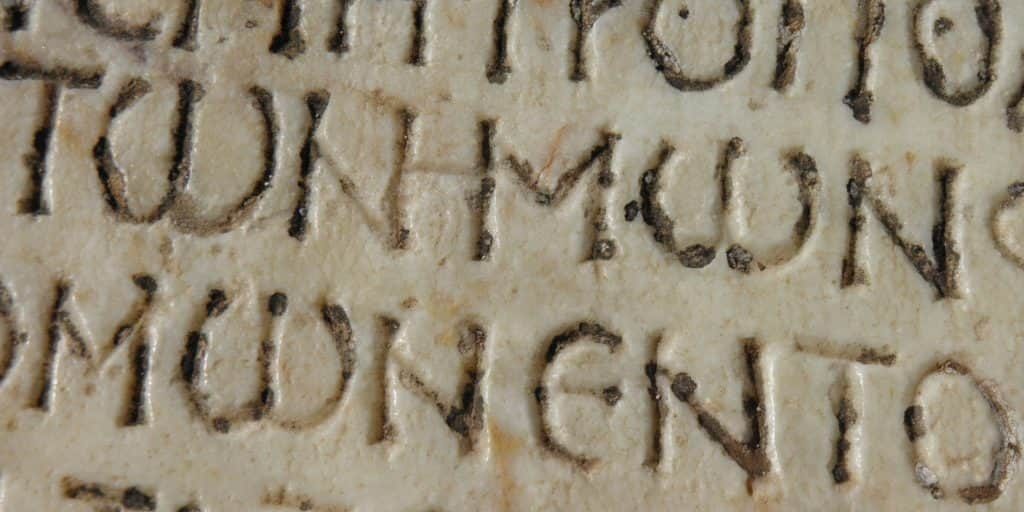Call free on: 0800 389 2839
Call free on: 0800 389 2839
Explore Our courses
Latin: A Course for Beginners Languages

Do you have a love for languages? Then studying our Latin for beginners course online will give you a strong foundation from which to build your skills. Carpe Diem and enrol today!
We use latin phrases in our day to day lives: Etc, ad hoc, vice versa to name but a few. Study our Latin course online to learn more about the language that is the origin of many modern languages spoken today.
Course content
Unit 1
- The verb: Infinitive and base
- Formation of third person singular present (indicative active)
- Noun and verb in agreement
- Simple sentences
- Nominative case
- Accusative case
- Plural forms
- Prepositions
- Movement ‘towards’
- Complete present indicative active
- First conjugation
- Reference books
Unit 2
- Possession: genitive case
- Position of the genitive
- Complement
- Second conjunction
- Dative case
- Method of translating longer sentences
Unit 3
- Adverbs
- Present indicative active of esse
- Position of esse
- Vocative case
- Ablative case
- Ablative case with prepositions
- First declension
- Four important facts about nouns
- The base of the noun
- Case endings
- Gender
- Meanings of the ablative
- Two exceptions in first declension
Unit 4
- The third declension
- Case endings of the third declension
- Neuter nouns
- The third conjugation
- Third conjugation verbs ending in -io
- The position of adverbs
- The fourth conjugation
- Principal ways of forming the genitive singular in third declension
- Gender in the third declension
- The imperative
- Use of inquit
- Pronouns
- Direct single questions
- Abbreviations
Unit 5
- Second declension
- Case endings of the second declension
- Neuter nouns of the second declension
- Two irregular nouns of the second declension
- The differences between vir and homo
- Adjectives
- Adjectives of the first class
- Agreement of adjectives
- Position of adjectives
- Perfect tense
- The perfect base
- Use of the vocabulary section
- The perfect tense endings
- Esse and posse
- Prolative infinitive
- Conjunctions
- Some special case usages
- story – Vulpes et gallus
Unit 6
- Revision
- Personal pronouns
- Possessive adjectives
- is, ea, id – he, she, it
- suus, a, um – his, hers, its, their
- Special use of neuter plural adjectives and pronouns
- Sentences and clauses
- Relative pronoun and adjectival clauses
- ‘Whole’, ‘middle’, ‘top’, etc
- Double direct questions
- Partitive genitive
- Work on extracts from Latin authors
Unit 7
- Future indicative active: 1st and 2nd conjugations
- Future indicative active: 3rd and 4th conjugations
- Future indicative of esse and posse
- Imperfect indicative active: 1st and 2nd conjugations
- Imperfect indicative active: 3rd and 4th conjugations
- Imperfect indicative active of esse and posse
- Adjectives of the second class
- More neuter nouns of the third declension
- Other facts about third declension nouns
- Reflexive pronouns
- The fourth principal part of the verb: the supine
- Apposition
- Two further examples of special usages of the ablative
Unit 8
- Future perfect indicative active
- Future temporal and conditional clauses
- Adverbial clauses of cause, time and condition
- Pluperfect indicative active
- Contracted form
- Comparison of objectives
- The comparative adjective
- Methods of expressing comparison
- The superlative adjective
- Adverbs
Unit 9
- The ablative of manner
- The accusative of age
- Time: how long ago?
- Time: how long before, how long after?
- the infinitive as a noun
Unit 10
- Fourth declension
- Fifth declension
- The present subjunctive active
- The present subjunctive active of esse and posse
- Imperfect subjunctive active
- Imperfect subjunctive active of esse and posse
- Some revision points on sentence structure
- Adverbial clauses of purpose in Latin
- Three methods of expressing ‘and’
- Sequence of tenses
- Points to watch: ‘may’, ‘might’
Unit 11
- Independent uses of the subjunctive: jussive subjunctive
- Independent uses of the subjunctive: deliberate subjunctive
- Independent uses of the subjunctive: subjunctive of desire
Unit 12
- Revision
Study Latin: A Course for Beginners with us and benefit from:
- Flexible learning
- Support from a personal tutor by email, phone or Skype
- Any time enrolment
- Assignments with tutor feedback
- Ongoing support from Student Support
- Forums to discuss your course with other students
learn@nec
Choose when and where you access your course, using learn@nec our 24/7 learning platform.
This easy-to-use learning platform includes interactive checkpoints, quizzes and activities to help you evaluate your progress.
Our course tutors
You’ll have access to support from a personal tutor. All NEC tutors are subject experts, with experience of supporting online learners.
Meet Ed who is just one of our first-class Latin tutors:
Ed is our lead tutor in Latin and studied classics at Trinity College Dublin and then at Gonville and Caius College Cambridge, where he conducted research into the narrative technique of Greek epic; he later studied economics and linguistics at the Open University. “This is one opportunity not to be missed. Learning Latin (and Greek) and being able to read the literature in the original has been the most rewarding and enriching experience of my life. If you are interested in literature of any kind, literature that excites the imagination, strikes awe into the soul and invites you into some of the most fantastic minds ever to record their thoughts in words, it’s all there. Studying Latin is a challenging, intellectually satisfying, life-enhancing opportunity.”
What you need to know
Format
- Online learning with support from a personal tutor
Entry requirements
- No previous knowledge is required for this course
- An ability to read and write in English
Hours
- Complete at your own pace
- Approx. 120-150 study hours, plus time for completing assignments
Assignments
- 13 assignments (one introductory)
Resources
- No additional set texts required
Requirements
- Internet access
- Computer operating system and browser to support learn@nec
What's included?
Our course fees are open and honest to help you plan for any additional costs.
Your course fee includes:
- Access to learn@nec
- All the course materials you need to complete the course
- Support from a personal tutor for up to 18 months from your date of enrolment
- Assignment marking
- NEC’s guide to study skills: How to Succeed as an Independent Learner
- Spelling, punctuation and grammar guide
- Time planner to help you plan your study timetable
Your course fee does not cover:
- The cost of optional textbooks
Optional extras:
- This course is entirely self-contained so no additional textbooks are required. However, you may find it helpful to purchase the following texts for additional reading:
- ‘Daily Life in Ancient Rome’ by J Carcopino, Penguin
- ‘The World of Rome’ by M Grant, Weidenfeld
Related blog posts
Studying Classical Civilisation and Latin with the National Extension College (NEC) – Featured blog post on The Classical Association website
Arrange a call back with a member of our Course Advice Team
Would you like to talk to our Course Advice Team about the best route for you? Visit our Contact Us page, fill in the form and a member of the team will get back to you!
Key facts
Course Fees £450
It’s your choice: you can pay in full at the point of enrolment, or you can spread the cost over monthly instalments with our finance offer. We offer a choice of six or 12 month repayment plans, with 0% APR as standard.
To pay in instalments you will need to enrol by telephone.
Representative example:
Course fee: £450
Deposit: £45
Amount of credit: £405
Monthly payment: £33.75
Duration of agreement: 12 months
Total repayable: £450.00
Rate of interest: 0% (fixed)
0% APR representative.
The National Extension College (NEC) work with finance company OMNI. For more information on our relationship with OMNI and repayment plans see our Fee Information page.
learn@nec is our virtual learning environment, the gateway to your course and the NEC community. All the resources you need to study are here and you have the flexibility to access them wherever you want, whenever you want
- No previous knowledge is required for this course
- An ability to read and write in English
As part of NEC’s mission to widen participation our team is happy to discuss payment options unavailable online. Please contact our team on 0800 389 2839 or email info@nec.ac.uk


